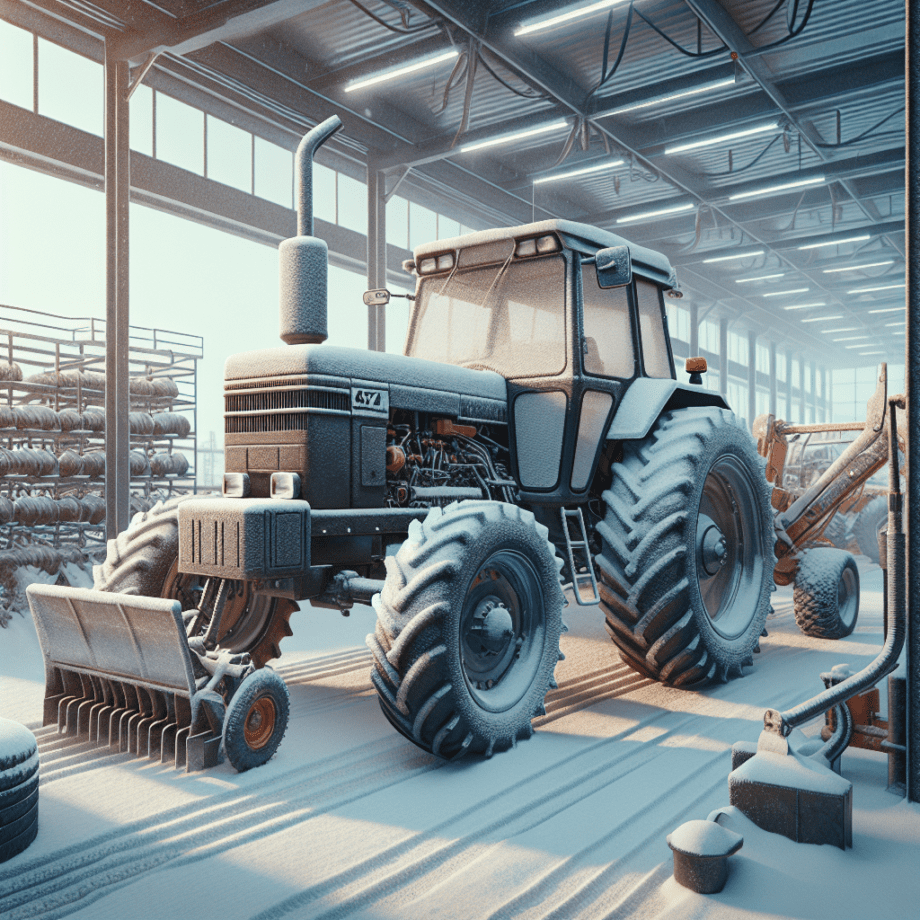Preparing your tractor for winter operations is crucial to ensure its longevity and optimal performance during the colder months. Winter can be particularly harsh on agricultural machinery, and taking the necessary steps to winterize your tractor can save you time, money, and headaches in the long run. This article will guide you through the essential steps to prepare your tractor for winter, covering everything from engine maintenance to tire care.
Engine Maintenance
The engine is the heart of your tractor, and it requires special attention as temperatures drop. Cold weather can make it harder for your engine to start and can increase wear and tear on its components. Here are some key steps to ensure your engine is winter-ready:
Check and Change the Oil
Using the right type of oil is crucial for winter operations. Cold temperatures can thicken the oil, making it harder for the engine to turn over. Consider switching to a lower-viscosity oil that is designed for cold weather. Additionally, make sure to change the oil filter to ensure optimal performance.
Inspect the Cooling System
Antifreeze is essential for preventing the engine’s cooling system from freezing. Check the antifreeze levels and top them up if necessary. It’s also a good idea to flush the cooling system and replace the antifreeze if it hasn’t been done in a while. Make sure the radiator and hoses are in good condition and free of leaks.
Battery Care
Cold weather can significantly reduce a battery’s efficiency. Inspect the battery terminals for corrosion and clean them if necessary. Ensure the battery is fully charged and consider using a battery maintainer to keep it in good condition throughout the winter. If your battery is old, it might be a good idea to replace it before the cold sets in.
Fuel System Preparation
The fuel system is another critical area that requires attention before winter. Cold temperatures can cause fuel to gel, leading to blockages and engine problems. Here are some steps to prepare your fuel system:
Use Winter-Grade Fuel
Switch to a winter-grade diesel fuel that is less likely to gel in cold temperatures. This type of fuel is formulated to remain fluid at lower temperatures, ensuring a steady flow to the engine.
Add Fuel Additives
Consider using fuel additives designed to prevent gelling and improve cold-weather performance. These additives can help keep the fuel system clean and free of blockages.
Keep the Fuel Tank Full
A full fuel tank reduces the amount of air inside, which can help prevent condensation and the formation of ice crystals. This simple step can go a long way in ensuring your tractor runs smoothly during the winter months.
Tire and Undercarriage Care
Winter conditions can be tough on your tractor’s tires and undercarriage. Proper maintenance in these areas can improve traction and prevent damage:
Inspect and Inflate Tires
Check the tire pressure regularly, as cold temperatures can cause it to drop. Properly inflated tires provide better traction and reduce the risk of flats. Inspect the tires for any signs of wear or damage and replace them if necessary.
Use Tire Chains
If you expect to operate your tractor in snowy or icy conditions, consider using tire chains. They can significantly improve traction and reduce the risk of slipping.
Clean the Undercarriage
Snow, ice, and road salt can accumulate on the undercarriage, leading to rust and corrosion. Regularly clean the undercarriage to remove any buildup and apply a protective coating if necessary.
Hydraulic System Maintenance
The hydraulic system is essential for the operation of various attachments and implements. Cold weather can affect the performance of hydraulic fluids and components:
Check Hydraulic Fluid Levels
Ensure the hydraulic fluid is at the correct level and top it up if necessary. Use a winter-grade hydraulic fluid that is designed to perform well in cold temperatures.
Inspect Hydraulic Hoses and Fittings
Cold weather can make hydraulic hoses and fittings more brittle, increasing the risk of leaks and breaks. Inspect them for any signs of wear or damage and replace them if needed.
Electrical System Checks
The electrical system is another area that requires attention before winter. Cold weather can affect the performance of electrical components:
Inspect Wiring and Connections
Check all wiring and connections for signs of wear, corrosion, or damage. Ensure all connections are secure and protected from moisture.
Test Lights and Signals
Winter days are shorter, and visibility can be reduced due to snow and fog. Ensure all lights and signals are functioning correctly to maintain safety during operation.
Storage and Shelter
Proper storage and shelter can protect your tractor from the harsh winter elements:
Store Indoors
If possible, store your tractor in a garage or shed to protect it from snow, ice, and freezing temperatures. This can also make it easier to start the engine and perform maintenance tasks.
Use a Tractor Cover
If indoor storage is not an option, use a high-quality tractor cover to protect it from the elements. Ensure the cover is secure and provides adequate ventilation to prevent moisture buildup.
Final Preparations
Before the winter season begins, take some final steps to ensure your tractor is ready for the cold:
Perform a Thorough Inspection
Conduct a comprehensive inspection of your tractor, checking all systems and components for any issues. Address any problems before they become more serious in the cold weather.
Keep Spare Parts and Tools Handy
Having spare parts and tools on hand can save you time and hassle if something goes wrong. Stock up on essential items like oil, filters, and tire repair kits.
Review the Owner’s Manual
Consult the owner’s manual for any specific winterization recommendations from the manufacturer. Following their guidelines can help ensure your tractor operates smoothly throughout the winter.
By following these steps, you can prepare your tractor for winter operations and ensure it remains in good working condition. Proper maintenance and preparation can help you avoid costly repairs and downtime, allowing you to focus on your agricultural tasks even in the harshest winter conditions.
